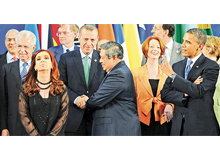| |
|
 |
Prime Minister Recep Tayyip Erdogan promised to provide the International Monetary Fund (IMF) with $5 billion during the G-20 meet at Los Cabos, Mexico, on Tuesday, where he called on attending countries to develop a roadmap for “sustained and balanced growth” amid a worsening crisis in the eurozone.
|
The Turkish transfer of $5 billion was accompanied by major contributions from other non-eurozone members and comes as the crisis in the eurozone has led to a sustained slowdown in more fragile developing economies around the world. The IMF parachute received additional backing to the tune of $10 billion contributions from Brazil, Russia, Brazil and Mexico each, as well as $2 billion from South Africa and $1.5 billion from Colombia on Tuesday.
Officials at the Office of the Prime Minister meanwhile said that the $5 billion contribution would be paid from the foreign exchange reserves of the Central Bank of Turkey, though the arrangement also allows Turkey to withdraw the contribution from the fund at its own behest.
Tuesday also provided the prime minister with a pulpit to laud Turkey’s remarkable weathering of the global economic crisis, calling the country an “island of stability” as he cited its 8.5 percent economic growth and $376 billion foreign trade volume in 2011.
Key to that buoyancy have been the country’s effective fiscal and monetary policies, improvements in the public debt structure and the reduced risk of liquidity in the banking system, Erdoğan said. But as the prime minister outlined Turkey’s own hopes to reach $1 trillion in foreign trade volume -- half of it in exports -- by 2023, he underlined the need among G-20 states, including Turkey, to seek vigorous reforms to weather the crisis.
“I think this summit is a great opportunity in terms of putting forth policies and commitments that will eliminate [continuing eurozone] risks,” Erdoğan said during his speech. The prime minister subsequently endorsed the Los Cabos summit’s “Growth and Employment Plan” and also called for the top 20 group to take more proactive steps in securing structural reforms in the globe’s worst-hit economies.
“We should have sound cooperation under the umbrella of the G-20 against any new development that may emerge in the global economy. We have to take new steps together,” he said. One of those steps should be “deep structural reforms,” said Erdoğan, as he called for “sound medium-term programs to play key roles in diminishing the effects of the economic crisis and increasing employment” around the globe.
Prime minister touts Turkish trade
The prime minister spoke about the need for global reform, but he also spoke at length about Turkey’s own business environment, trade goals and growth opportunities while addressing an audience in the B-20 business summit on “Trade and Investment.”
Erdoğan told business leaders at the summit that since a round of reforms that followed Turkey’s 2001 banking crisis, Turkey has become a country of accelerating foreign trade volume, a lucrative investment environment and a rapid growth rate. That growth rate has increased continuously since 2002 and was outpaced in 2011 only by China.
On Tuesday Erdoğan said that growth would be facilitated in coming quarters by further improving transparency in Turkish laws with regard to business rights and equal rights for foreign and private investors. “Turkey has developed a public-private sector dialogue and cooperation model to increase competitive power within the scope of investment atmosphere reform,” Erdoğan told conference goers.
Erdoğan said Turkey’s reform program has been carried out by two main platforms: the Investment Atmosphere Rehabilitation Coordination Board and the Investment Advisory Council. Reforms have allowed Turkey to attract $110.5 billion in international investments between 2002 and 2011, and against an average growth in foreign direct investment (FDI) of 18.5 percent internationally, Turkey’s growth in FDI has been 76 percent since 2002. “This indicates the belief of investors in Turkey’s stability and atmosphere of confidence,” Erdoğan said, adding, “Turkey will also continue to reinvent its investment atmosphere.”
The picture for Turkey’s economy is far from certain, however, as its high performance comes at the cost of a large current account deficit (CAD) and external debt in the financial sector, which have made the Turkish economy increasingly fragile.
Turkey’s CAD, which largely reflects its total dependence on energy imports, is seen as the booming economy’s main weakness. The deficit stood at 10 percent of gross domestic product (GDP) in 2011 but is expected to decline to 8 percent this year. The country’s rate of growth is also expected to slow dramatically to 4 percent in 2012.
|
Source : todayszaman.com
Hit : 680
|
|
|
|




